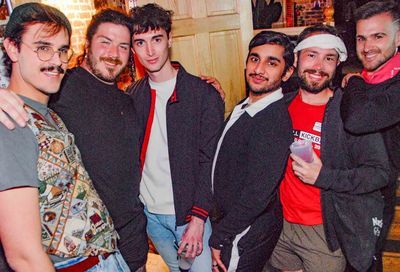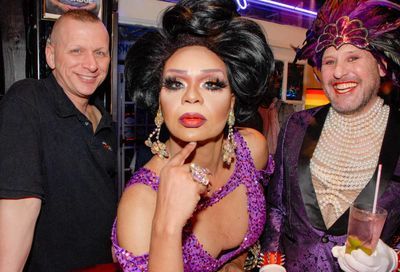Former Log Cabin Republicans president comes out against Equality Act in op-ed
Gregory Angelo says the Equality Act doesn't provide enough religious exemptions, but legal organizations disagree

The former president of the Log Cabin Republicans is receiving pushback from some civil rights advocates who take issue with arguments he made in an op-ed for The Washington Examiner urging Congress not to pass the Equality Act.
Gregory T. Angelo says the Equality Act — which, in summation, would amend the Civil Rights Act of 1964 to include protections for people based on their sexual orientation or gender identity — does not go far enough in protecting religious liberty. According to Angelo, “All reasonable Americans, especially gay Americans who support pluralism and tolerance, should oppose it.”
Angelo says that while the aims of protecting LGBTQ people in federal law are commendable — and, according to recent polls, widely supported in the abstract — the Equality Act is fatally flawed when looking at the details of the religious exemptions provided in the act.
“While no Catholic priest could be compelled by the ‘Equality Act’ to perform a same-sex marriage, for example, Catholic Charities would see any claim to federal funds eliminated as long as they enforced moral policies in line with Church doctrine,” writes Angelo. “Evangelical campuses would see their nonprofit status jeopardized. Private businesses whose owners held beliefs that prevented them from participating in same-sex wedding celebrations would be forced to do so or close their doors.”
Angelo also argues that free market forces and the gradual increase in support of LGBTQ inclusion by corporate America, resulting in pro-LGBTQ hiring practices, employee benefits, and opportunities for advancement, has begun to shift the needle without passage of sweeping federal legislation.
He claims that because anti-LGBTQ discrimination is not as pervasive as it once was, there is less need for a piece of legislation like the Equality Act.
“In the run-up to the United States Supreme Court marriage equality decisions of 2013 and 2015, gay advocates such as myself promised those we disagreed with that allowing same-sex couples to marry would have no effect on them, their families, or their faith,” Angelo concludes. “Passage of the ‘Equality Act’ would make liars out of the lot of us. It would put the nonprofit status of religious charities at risk; it would force mom-and-pop businesses to participate in same-sex marriage ceremonies; and it would flout bedrock principles that have served as the foundation of the American experience for centuries.”
But several legal experts working for various civil rights groups have blasted Angelo’s rhetoric and what they say is a misrepresentation of what the act actually does.
“The Equality Act incorporates protections for LGBT people using the existing civil rights framework that has been in place for 50 years with respect to race discrimination, national origin discrimination, sex discrimination and discrimination based on religion,” says Jenny Pizer, the law and policy director of Lambda Legal.
“The Civil Rights Act is not just about racial segregation, although bringing a true in fact end to racial segregation was a motivating goal, but it’s not the only goal,” adds Pizer. “The words on the page make clear that Congress recognized that there was pernicious discrimination of multiple types and Congress was committed to eradicating all of those types of discrimination. The Civil Rights Act of 1964 builds into that framework special accommodation for religion. And the Equality Act maintains that and embraces that same approach.”
So, for example, in current law, and if the Equality Act passes, religious organizations will continue to be allowed to give preferential treatment to job applicants who are of the same faith when hiring.
“There are a number of points that Gregory makes in this op-ed that are simply just not true. I mean, they are among right wing talking points that he may have absorbed in good faith, but they’re simply not true,” adds Pizer. “…There’s nothing about the Equality Act that changes the current reality that there are religious nonprofits of many types that favor people of the same faith and that do their business according to religious tenants without any risk of losing their tax status.”

Sunu Chandy, the legal director of the National Women’s Law Center, which is backing the Equality Act, echoes Pizer’s comments.
“The Equality Act does not change the longstanding exemptions that are already contained in federal civil rights laws. For example, there are exemptions for religious entities, like churches and mosques and synagogues, that allow varying kinds of protections. There’s also religious protections for individuals in the workplace to have religious accommodations. Those don’t change. There’s also some protections under Federal Housing law for religious entities. … Whatever religious exemptions or religious entities that are available under Federal civil rights laws would remain, and whatever religious protections workers have in the workplace would remain.”
Chandy adds that she believes that Angelo has conflated the exemptions in civil rights laws with those espoused by the federal Religious Freedom Restoration Act, which are not the same.
“I think he’s reading that RFRA cannot be used as a defense [for discriminating] to mean that now religious organizations don’t have rights anymore, and those are not the same thing. So I think it’s important to make both points: the Federal civil rights have religious exemptions, but it’s also important to say the way the law is set up, you cannot use RFRA to defend discrimination if you are a public business, if you’re doing business in the public space,” Chandy says.
She notes that people in rural areas or states without existing LGBTQ protections are made particularly vulnerable by the lack of inclusive state civil rights laws, as there may only be a handful of businesses that deliver particular services.
“I do not see us living in a nation where we can say that some public entities or some organizations can discriminate, and it’s really going to be their choice whether they discriminate or not,” she adds. “That is not a way to set up civil rights protections. I mean, can you imagine if that was the law when it came to any other protected basis?”

Rose Saxe, the deputy project director of the LGBT and HIV Project at the American Civil Liberties Union, notes that the alleged harms that Angelo claims will befall adoption agencies, religious organizations, or business owners with conservative religious beliefs have not occurred in the 20 states with robust, LGBTQ-inclusive nondiscrimination laws.
While Catholic Charities has claimed it has been “forced” to close in some states because of its refusal to place children with prospective adoptive or foster parents who are same-sex couples, they have done so of their own accord.
Saxe says she believes the way the issue has been framed by conservatives is problematic because the issue, in the context of adoption agencies, has been about whether religious organizations have a fundamental right to take taxpayer dollars and then refuse to serve certain taxpayers.
“The claim that any religiously-affiliated charity that holds beliefs about marriage or about transgender people will be targeted by the Equality Act is part of the problem,” she says. “The Equality Act doesn’t target any organization because of their beliefs. All entities, when talking about ability to participate in taxpayer funded programs, all organizations are gonna be held to the same standard.
“In the states where nondiscrimination is already the rule, we haven’t seen a widespread number of entities going out of business. We’ve seen no interruption in care to the children when we’re talking about adoption agencies. And the fact of the matter is it’s not about the agency’s beliefs, it’s about the activities that they are engaging in.”
Saxe notes that part of the debate over the Civil Rights Act in the 1960s centered around exemptions for religious organizations, some of which had beliefs around race or sex that were discriminatory.
“What the Civil Rights Act said was that religious organizations can have a preference for people of their faith in hiring and they can have a preference in non-commercial housing decisions, such as when we’re talking about church or religious-entity owned property,” she notes. “But what we didn’t say was that those same organizations could discriminate based on race or based on sex.”
As such, she argues, the addition of protections for LGBTQ people does not require any changes to the existing exemptions, because the current ones have been sufficient in balancing so-called “religious liberty” with the government’s interest in prohibiting discrimination against different individuals.
While passing the Equality Act will not solve or prevent all instances of discrimination, Saxe adds, the act will send a “clear message” about how people should be treated, and will provide courts with guidance on how to proceed when hearing complaints alleging discrimination.
“You can hold your beliefs, but we don’t always get to say what we’re thinking. And while the ACLU is a very staunch First Amendment defender, at the same time, the law recognizes that there’s a difference between the ability to be punished for your beliefs, which we don’t do, and conduct. … Nobody’s going to be penalized because of their beliefs. But where your conduct amounts to harassment or discrimination, that’s a different question and we’ve long said that the law can regulate that kind of behavior.
“There’s a difference between being able to write an op-ed saying, ‘I don’t think same sex couples should be able to marry.’ Or being able to say that on Facebook or wherever. And saying, ‘I refuse to sell products, the same products that I would sell to a straight couple, to a same sex couple.’ Because providing goods and services on equal terms isn’t actually endorsing a particular customer. It’s simply treating everybody the same.”
Another part of Angelo’s op-ed cited the lack of support from “major African-American legacy civil rights groups,” most notably the NAACP, in amending the Civil Rights Act to add sexual orientation and gender identity to the list of characteristics protected under the act. But that line of argument was undercut by news that broke Friday night that the NAACP had endorsed the Equality Act.
As to Angelo’s claim of the free market resolving most forms of discrimination, the legal advocates vehemently disagree.
“It’s simply not true,” Lambda Legal’s Pizer says of such claims. “I think there are some people who are predominantly wealthy, white, male, able-bodied and privileged in a range of ways, who experience less discrimination day to day than people who are relatively speaking, poor people of color, transgender, living with disabilities. It is just simply not true that the invisible hand of the market place in time will distribute goods in a fair manner and opportunity in a fair manner. I think many of us wish that that were true, but it simply isn’t.
“I think one only has to spend a brief moment reviewing the results of the United States Transgender Survey, as published by the National Center for Transgender Equality, to absorb the realities of life for members of our communities who experience pervasive, pernicious, harmful discrimination,” she adds. “And here at Lambda Legal, we receive thousands of calls for help every year from people who have experienced discrimination of many different types in every corner of this country.”

Kristine Lucius, the executive vice president for policy at The Leadership Conference on Civil and Human Rights, notes that the Equality Act would also expand the definition of public accommodations beyond just hotels and restaurants — which, at the time of the Civil Rights Act’s passage, were the major forms of “public accommodations” where African-Americans and others experienced discrimination. Under the Equality Act, the definition of public accommodations would be expanded to include retail stores and public spaces.
Lucius adds that she’s been particularly impressed with how the act’s major sponsors, U.S. Sen. Jeff Merkley (D-Ore.) and U.S. Rep. David Cicilline (D-R.I.) have handled questions about the bill and reached out to civil rights organizations, particularly communities of color, to explain the intent behind the act.
“There are conversations happening making sure that as this proceeds, it will be handled carefully, and that no one’s intent is to do anything to erode existing protections but instead just to clarify who is protected from discrimination,” Lucius says.
“Any effort to undercut existing civil rights laws would be led by the Republican Party, unfortunately, which Mr. Angelo is a part of,” she adds. “What I didn’t see in his op-ed was talking about the importance of not losing any ground or eroding existing protections. Unfortunately, Rs are leading an effort to pack the courts with people who are trying to undermine civil rights.”
Lucius says one of the biggest challenges in passing the Equality Act is the degree to which Americans, and many congressional lawmakers, are unaware of the lack of protections for LGBTQ people.
“There’s a misconception that all 50 states have these protections already,” she says. “And when people learn that they don’t, that’s when you get ‘lightbulb’ moments in lobbying meetings, frankly.”
Support Metro Weekly’s Journalism
These are challenging times for news organizations. And yet it’s crucial we stay active and provide vital resources and information to both our local readers and the world. So won’t you please take a moment and consider supporting Metro Weekly with a membership? For as little as $5 a month, you can help ensure Metro Weekly magazine and MetroWeekly.com remain free, viable resources as we provide the best, most diverse, culturally-resonant LGBTQ coverage in both the D.C. region and around the world. Memberships come with exclusive perks and discounts, your own personal digital delivery of each week’s magazine (and an archive), access to our Member's Lounge when it launches this fall, and exclusive members-only items like Metro Weekly Membership Mugs and Tote Bags! Check out all our membership levels here and please join us today!


























